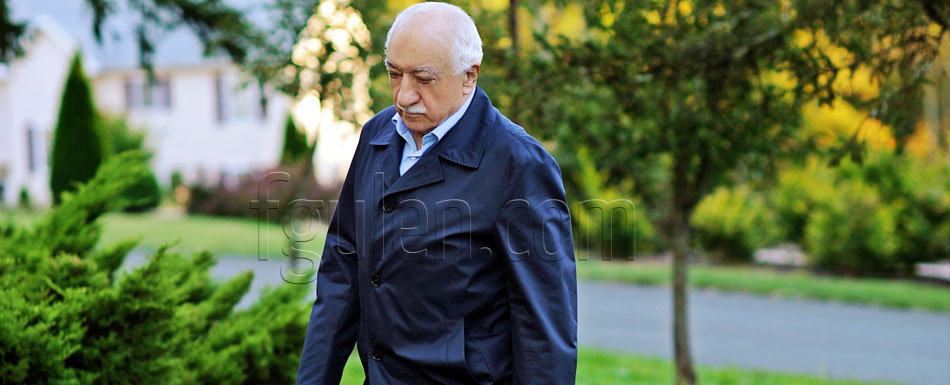Gülen says Turkey needs new constitution to save its democracy

Turkish Islamic scholar Fethullah Gülen, who has been silent in the past few months amid government moves to contain a recent corruption scandal, has urged Turkey to write a brand new constitution as a way to save its democracy.
In an op-ed published in Financial Times on Monday, Gülen said there is inherent trust, which Turkey painstakingly built over the past decade, in a democratic and accountable government that respects the rule of law. Until recently, he added, it was seen as an example of a country that prospered while maintaining a democratic government run by observant Muslim leaders.
"No longer," he continued, stating that a small group within the government’s executive branch is "holding to ransom the entire country’s progress." He claimed that the support of a broad segment of the Turkish public is now being squandered, along with the opportunity to join the European Union.
He noted that several recent actions of the Turkish government have drawn strong criticism from the EU and other western countries – among them, a law that gives the justice minister powers to appoint and discipline judges and prosecutors; a bill to curb internet freedoms; and a draft law that would give Turkey’s intelligence agency powers akin to those claimed by dictatorial regimes.
Gülen hailed the ruling party's attempt to end military interference in domestic politics as "necessary" after decades of coups and political dysfunction, adding that democratic reforms towards that end were praised by the EU and supported by a majority of Turks, as evidenced in the 2010 constitutional referendum.
"But the dominance in politics that was once enjoyed by the military now appears to have been replaced by a hegemony of the executive. A dark shadow has been cast over achievements of the past decade – the result of insidious profiling of certain groups of Turkish citizens for their views, constant shuffling of civil servants for political convenience, and an unprecedented subjugation of the media, the judiciary and civil society," Gülen said.
Gülen noted that the only way for the Turkish government to restore trust at home and regain respect abroad is by renewing its commitment to universal human rights, the rule of law and accountable governance. This commitment, he said, must include a new, democratic constitution, drafted by civilians. He argued that democracy does not conflict with Islamic principles of governance and that the ethical goals of Islam, such as protection of life and religious freedom, are best served in a democracy where citizens participate in government.
Gülen said people also need to embrace certain values that form the fabric of a thriving nation. One such value, he said, is respect for diversity of all kinds – religious, cultural, social and political.
"This does not mean compromising on our beliefs. On the contrary, accepting every person – regardless of colour or creed – as a dignified creature of God demonstrates respect for the free will God has given all human beings," Gülen said.
Gülen stated that freedom of thought and expression are indispensable ingredients of democracy and that Turkey’s poor showing in rankings of transparency and media freedom is disappointing. He said mature people welcome criticism – which, if true, helps people improve. "But we should criticise misguided ideas and actions, rather than individuals, to avoid creating unnecessary tensions," he said.
Gülen stated that the reductionist view of seeking political power in the name of a religion contradicts the spirit of Islam and when religion and politics are mixed, both suffer – religion most of all. Gülen argued that every segment of Turkish society has a right to be represented in government, but the Turkish state has long discriminated against citizens and public servants on the basis of their views. Democratic inclusion, he said, will encourage people to disclose personal beliefs without fear of persecution.
Since the 1970s, Gülen claimed, participants in the Hizmet movement, who come from all walks of life, have worked to provide equal opportunity for all, through educational institutions, relief organisations and other civil society projects and their primary motivations are intrinsic, as they seek to find happiness in the happiness of others.
"Hizmet participants – and I consider myself one of them – are not political players and have no interest in the privileges of power," Gülen assured, saying that this is evident from their personal and financial commitment to humanitarian aid, education and dialogue, as well as their purposeful absence from political office.
Apart from encouraging citizens to vote, Gülen said he has never endorsed or opposed a political party or candidate, and will refrain from doing so in future. He added that he trusts the wisdom of Turkish people and believe they will preserve democracy and hold the interests of the nation above partisan political concerns.
"I have spent the past 15 years in spiritual retreat and, irrespective of what happens in Turkey, I intend to continue to do so. I pray that Turkey sees its current troubles as an opportunity to advance democracy, freedom and the rule of law. And I believe that by renewing our commitment to fundamental democratic principles, we can re-establish trust and stability and revive the Turkish example that had become an inspiration for the region and the world," Gülen concluded.
- Created on .
